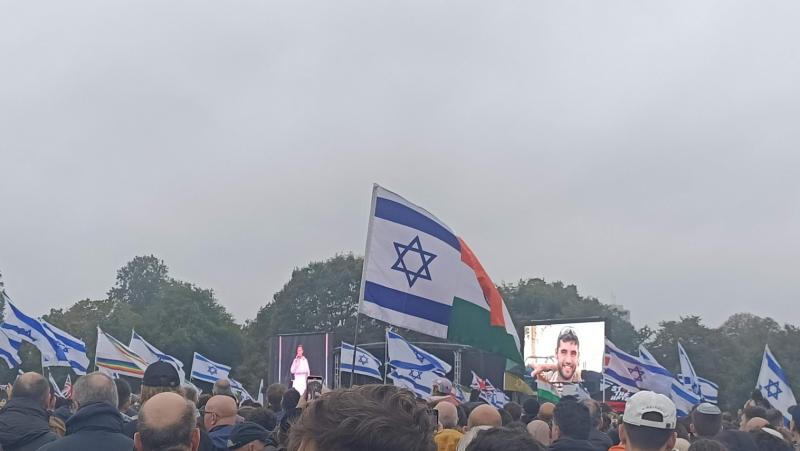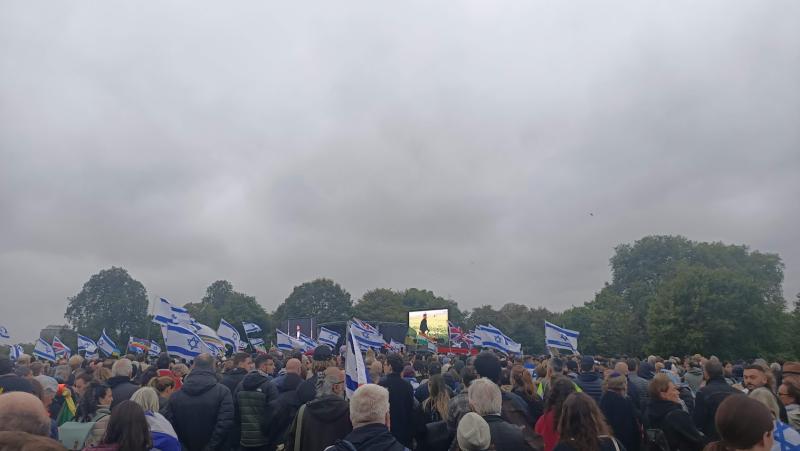One Year On: Remembering October 7 in London
Last weekend in London, under a lowering sky, thousands of people gathered in Hyde Park to stand in solidarity with Israel the day before the anniversary on the 10/7 Hamas massacre on Israel’s border with Gaza. I was there to witness the event and speak to some of those standing quietly in the drizzle to commemorate the dead and bear witness to hostages still alive in captivity.
The rally was organised by a coalition of British organisations - the Board of Deputies, the Jewish Leadership Council, 7/10 Human Chain, The Hostages and Missing Families Forum UK, UJIA and the Jewish Agency for Israel. It was clear though, amongst the crowds, that people of all nationalities had turned up to show their support for Israel under fire and the hostages still detained in tunnels under Gaza. I saw Union flags, Indian flags, and old style Iranian flags fluttering in the breeze amid a sea of blue and white Israeli standards.
It was a family event, as well, with many children and young people present. They stood in front of a giant screen that showed the faces of those murdered on that terrible day one year ago. It took over an hour for this mosaic of incalculable loss to finish. Many of those cut down by Hamas when they rampaged through the Nova festival were not much older than the youngsters looking up at them. It was a sobering reminder of the callousness, futility, and cruelty that is violent extremism.
Perhaps the most moving part of the whole occasion was personified by the agony of one woman still hoping for the life of her daughter amid this requiem for the dead. Mandy Demari came on stage to speak about her child, shot and taken hostage by Hamas at the Nova festival and still held by them a year later. Emily, 28, is the only British-Israeli hostage held in Gaza. Her mother spent time describing her ‘beautiful, funny and brave’ daughter who she feels has been forgotten by the British government and is virtually unknown to the British public. The distress and trauma were visible on her face and in her voice as she described the ‘hell’ of not knowing whether her beloved daughter was alive or dead, hoping for the best but fearing the worst every waking moment: She said, “Since 7 October last year, [Emily] has been held a hostage by Hamas terrorists in the Gaza terror tunnels, 20 metres or more underground, kept in captivity, tortured, isolated, unable to eat, speak or even move without someone else's permission.”
Her quiet agony was at times drowned out by a police helicopter that buzzed above—a stark reminder, along with the significant police presence on the ground, that Jews are not entirely safe in this country, either, even as they remember their dead.
The Prime Minister, Sir Keir Starmer, and his Foreign Secretary met relatives of hostages a week ago and was implored to do more to secure their release. He sent out a statement of support for Israel on her darkest of days that promised ‘solidarity’ with the country and reiterated his horror and disgust at the Hamas pogrom. There are many within the Jewish community here who I’ve spoken with and who have endured a huge rise in antisemitic hate crimes who hope that his actions have the same conviction of his words. They are not yet convinced. Too many of those who elevated him to power with their votes view Hamas’s terrorism as legitimate resistance and even refuse to believe the evidence of rape, torture, and murder recorded gleefully on Hamas’s own body cams.
The solemn commemoration ended with Ada Sagi lighting one of 23 candles on stage. Sagi, 75, is one of the hostages who was released after 53 days in captivity. Each candle lit represented a country or religion of the hostages taken by Hamas one year ago. Ms. Sagi was taken from her home in the Nir Oz Kibbutz, close to the Gaza border fence, and held by paid captors in a hospital and an apartment. Before the awful events of October 7, she was a beacon of hope for reconciliation: committed to peaceful co-existence with the enemies surrounding Israel, she taught Jewish people Arabic so that they could speak to their neighbours. Ms. Sagi no longer believes it is possible to make peace with Hamas. The sadistic barbarity she witnessed was simply too much. No one lives in Nir Oz anymore.
The crowds dispersed after the Israeli national anthem ‘Hatikva’ was sung. This is the Hebrew word for ‘the hope’. Those who stand with Israel are hoping for peace and a return of the 101 hostages still held in Gaza. It is certain that some of these will have been killed in the combat since October 7, or simply murdered in pursuit of the twisted terrorist objective of leveraging the horror of those held deep underground, surrounded by what’s left of the Hamas leadership. There was hope in the air on Sunday but also quiet resignation. As we left the park, a lone man taunted the young people who were forced to put their flags away or else become a target for assault on the way home. “Why don’t you show it?” he cried, offering the Jews in the crowds copies of the Quaran as police officers stared impassively on. I drew my Israeli companion’s attention to this. She shrugged. “The hatred? It’s so much I don’t even see it anymore.”
Below, images from a rally in Hyde Park, London, held in solidarity with Israel on the eve of the October 7 anniversary. (Source: Ian Acheson/Author)


Stay up to date on our latest news.
Get the latest news on extremism and counter-extremism delivered to your inbox.